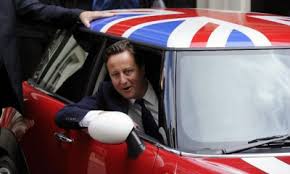Well, it’s been almost a week and the repercussions of the UK’s vote to leave Europe are still rumbling on and still pretty much unknown. Although the direst predictions of the Remain campaign have largely come to pass, no one's quite sure how bad things are going to get or how long this will go on for. One thing is certain, it’s going to have a significant effect on motoring…
Will Brexit affect the value of my car?
This is likely the biggest effect which Irish motorists will notice. Sterling is (at the time of writing) trading at its lowest value against the benchmark US Dollar since 1985. Historically, it’s not as low against the Euro as it was in the early 2000's, but it’s not far off and there’s no doubt that there is now better value to be had shopping in the UK market than has recently been the case.
 That has significant implications for used values here in Ireland. The primary reason that Irish used car prices have been high of late has been the dearth of good second hand stock from the years 2009 to 2013, because Irish new car sales were so low during that period. The strength of Sterling against the Euro kept people back from compensating for that lack of supply by dipping into the UK market.
That has significant implications for used values here in Ireland. The primary reason that Irish used car prices have been high of late has been the dearth of good second hand stock from the years 2009 to 2013, because Irish new car sales were so low during that period. The strength of Sterling against the Euro kept people back from compensating for that lack of supply by dipping into the UK market.
That has now changed, and businesses such as Palmdale (which is a personal car-shopping service based in the UK) have reported significantly increased inquiries from Irish customers looking for a used bargain. If there is a flood of UK imports into Ireland, it will inevitably cause a softening of Irish used car values, thereby increasing the amount of depreciation you will face as an owner. To find out more on how to value a car see our Value My Car article.
Used car values in Ireland have actually been rising of late, with a three-year old car this year actually worth slightly more than an equivalent car would have been last year, but the rate of gain was already slowing down – the increase in second hand prices had slowed from 18 per cent last year to 13 per cent this year. Brexit will unquestionably have an effect on that, but whether it will be as significant as the fall-off in values experienced in the double-whammy of the tax system changes and the descent into recession in 2008-2009 remains to be seen.
Will Brexit affect the cost of a new car?
 This is a bit of an unknown as yet, but there is likely to be an effect. If used values drop, then those who have bought cars on a personal contract purchase (PCP) will potentially find that they may have less money to use as a deposit for a subsequent purchase when they come to end of their current finance agreement. The used value of the car is guaranteed, so if you plan to pay off the final amount in full and keep the car, or to hand it back and walk away from the deal, then you’re not going to be out of pocket. But, if you plan, as many do, to roll the deal over into a new car then you may find that falling used values have eaten into your deposit for your next car. If the value of your car has dropped below the minimum value agreed at the start of the PCP, then it will reduce the amount of equity left to act as a deposit. In severe cases, there may be no equity left at all. We have already seen such an effect in some areas in the UK, thanks to simple oversupply of used vehicles in specific vehicle classes thanks to the fact that car sales in Britain have been booming for the past few years.
This is a bit of an unknown as yet, but there is likely to be an effect. If used values drop, then those who have bought cars on a personal contract purchase (PCP) will potentially find that they may have less money to use as a deposit for a subsequent purchase when they come to end of their current finance agreement. The used value of the car is guaranteed, so if you plan to pay off the final amount in full and keep the car, or to hand it back and walk away from the deal, then you’re not going to be out of pocket. But, if you plan, as many do, to roll the deal over into a new car then you may find that falling used values have eaten into your deposit for your next car. If the value of your car has dropped below the minimum value agreed at the start of the PCP, then it will reduce the amount of equity left to act as a deposit. In severe cases, there may be no equity left at all. We have already seen such an effect in some areas in the UK, thanks to simple oversupply of used vehicles in specific vehicle classes thanks to the fact that car sales in Britain have been booming for the past few years.
 There’s another potential effect and that’s the the new list prices of cars which we buy here which are built in the UK. Many hugely popular models, including the Nissan Qashqai, Toyota Auris and Avensis, Opel Astra, Honda Civic, Mini, Range Rover Evoque and more are built in the UK, and those companies are warning that Brexit will add to the cost of building those cars, especially if Britain does leave the EU common market. Toyota, which exports three-quarters of the cars it makes in the UK to Europe, said that “continued British membership of the EU is the best for our operations and long-term competitiveness. We will face significant business challenges as a result of a decision to withdraw from the EU.” BMW has echoed Toyota’s warnings, and Renault-Nissan boss Carlos Ghosn has repeatedly warned that a Brexit could force Nissan to re-evaluate its investments in its vast factory in Sunderland, upon which tens of thousands of jobs in a heavily deprived region depend.
There’s another potential effect and that’s the the new list prices of cars which we buy here which are built in the UK. Many hugely popular models, including the Nissan Qashqai, Toyota Auris and Avensis, Opel Astra, Honda Civic, Mini, Range Rover Evoque and more are built in the UK, and those companies are warning that Brexit will add to the cost of building those cars, especially if Britain does leave the EU common market. Toyota, which exports three-quarters of the cars it makes in the UK to Europe, said that “continued British membership of the EU is the best for our operations and long-term competitiveness. We will face significant business challenges as a result of a decision to withdraw from the EU.” BMW has echoed Toyota’s warnings, and Renault-Nissan boss Carlos Ghosn has repeatedly warned that a Brexit could force Nissan to re-evaluate its investments in its vast factory in Sunderland, upon which tens of thousands of jobs in a heavily deprived region depend.
The thing is that we just do not know. While Sterling’s value will be battered for some time to come, the other questions over trade restrictions and tariffs will take at least two years, perhaps longer to work out and only then will we know the full impact of Brexit on the wider motor industry and the Irish car trade in particular.